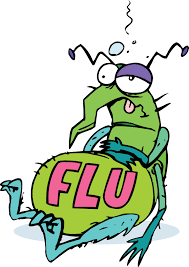
How many myths about the flu do you have going on?
Influenza: What you need to know
by Dr. Ali Badday

Hello Citizens of the Arts District,
It’s officially flu season. It is the time when the weather changes, daylight hours become less, and a time where you or someone you know gets decommissioned for a few days from the influenza virus.
To help better understand what the flu is, sometimes a great place to start is clearing some of its misconceptions.
What are flu myths?
Myth #1: The flu is the same thing as a cold and it is harmless.
It is common to confuse the flu with a cold. Both have similar symptoms and often are treated with similar methods. However, colds are mild and last longer. The flu usually occurs suddenly and lasts 2 to 3 days. The flu also is contagious and can be dangerous.
Symptoms of the flu include:
- fever of 102°F or higher
- chills and sweats
- nausea and vomiting
- muscle aches and headaches
- chest pain
- cough
- stuffy nose
- loss of appetite.
Myth #2: You can’t die from the flu.
People who have severe cases of the flu or are high risk can die from the flu. High-risk people include:
- Babies or children up to 4 years old.
- Anyone 65 years of age or older.
- Women who are pregnant, trying to get pregnant, or breastfeeding.
- Anyone who has a low or weakened immune system.
- Anyone who has a chronic health condition.
- Anyone who lives in in a long-term care center.
These people are at greater risk of having health problems that lead to death. It is even more important that they receive an annual flu vaccine. It helps prevent severe cases or problems related to flu. It also lowers their chance of needing to go the hospital, which raises costs.
If you aren’t high risk, you still should get a flu vaccine. It protects everyone around you. This is especially true if you work in health care or care for high-risk people.
Myth #3: You won’t get the flu if you get the flu vaccine.
The flu vaccine helps to prevent the flu. Every year, its purpose is to protect you from the main types of influenza. However, you still can get the flu. You could have been infected with the flu before you got the vaccine. You also could get another type of flu that the vaccine does not cover. Most likely, you will have a milder case than if you hadn’t gotten the shot.
There are other things you can do to lower your risk of getting the flu. These include:
- Washing your hands often.
- Covering your mouth when you sneeze and cough.
- Using household cleaning spray to disinfect surfaces and objects.
- Using hand sanitizer.
- Washing laundry of sick people separate from other items.
- Keeping your children, especially newborns, away from anyone who is sick.
Myth #4: You won’t get the flu if you take vitamin C.
Vitamins cannot prevent the flu. Using vitamin C can improve your immune system, but you can still get the flu.
Myth #5: The flu vaccine will give you the flu.
You cannot get the flu from a flu shot. This form of vaccine is made up of dead viruses that can’t infect you. The nasal spray flu vaccine is made up of live, but weakened viruses. The nasal spray vaccine is no longer recommended.
You can’t get the flu, but you can have side effects. The area of the shot could be red, sore, or swollen. You also may have muscle aches, headaches, or a low fever for a short period of time. These effects occur when your body responds to fight the new virus. You also can have flu-like symptoms from other health issues, such as a bad cold.
Myth #6: You shouldn’t get the flu vaccine if you’re pregnant or breastfeeding.
It is important to get the flu shot if you are pregnant, trying to get pregnant, or breastfeeding. The flu shot is safe for you and your baby.
If you don’t get the flu shot and develop the flu, you could give it to your baby. Your doctor might prescribe antiviral medicine to help reduce symptoms. They also might suggest another form of feeding until you are better.
Myth #7: You shouldn’t get the flu vaccine if you have an egg allergy.
The amount of egg allergen in the flu vaccine is very small. It is safe for people with egg allergies, even kids, to get the flu shot. Serious allergic reactions are rare. If you are at risk, doctors recommend getting the shot at your doctor’s office instead of a drugstore. This way, your doctor can monitor any potential reactions.
Myth #8: You don’t need to get the flu vaccine if you’re healthy.
It is good to live a healthy lifestyle, but it can’t prevent the flu. It is an infection that spreads easily. Everyone over 6 months of age should get the flu vaccine, except for rare cases.
Myth #9: You shouldn’t get the flu shot if you’re sick or already have had the flu.
It is okay to get the flu vaccine when you have a mild sickness. However, your doctor may suggest waiting until you’re better. It also is okay to get the flu shot if you have cancer.
You still should get the flu shot if you’ve already had the flu. The flu vaccine protects you against several types of the virus.
Myth #10: You don’t need to get the flu vaccine every year.
The flu is caused by the influenza virus, which can change from year to year. Because of this, the flu vaccine is adapted to protect against the main types of flu. You should get the flu vaccine every year at the beginning of the flu season. Flu season occurs in the colder months of year, typically October to May.
Myth #11: Getting the flu vaccine more than once a year will decrease your chance of getting the flu even more.
There is no research that multiple flu vaccines will lower your chance of getting the flu. However, some kids or older adults may need two doses of the flu vaccine. This depends on your age and medical history. Talk to your doctor to see if you should receive two doses.
Myth #12: You should wait until later in the flu season to get the vaccine. Then you will be protected longer.
The CDC recommends getting the flu vaccine as soon as it’s ready at the beginning of flu season. It can take up to 2 weeks for the your body to build protection against the flu. You should get the shot before the flu becomes more contagious. However, it still is better to get the flu shot late than not at all.
When to see your doctor
There are rare cases where you should not get the flu shot. Guillain-Barré syndrome is a condition that affects your nerves. Some people also have severe reactions or adverse side effects to the flu vaccine. Talk to your doctor first if this includes you.
Most cases of the flu go can be treated at home and will go away on their own. Make sure you drink a lot of liquids and get extra rest. Adults can take aspirin, ibuprofen, or over-the-counter flu medicine to reduce symptoms. Check with your doctor before giving your child any medicine to treat the flu. They can suggest what type and amount of medicine you can give.
If symptoms continue or if you are at high risk, contact your doctor right away. They can perform an exam and order tests to confirm influenza or rule it out.
Signs that the flu is getting worse include:
- Prolonged, high fever.
- Troubled breathing.
- Skin color turning blue (babies).
- Constant chest pain or pressure.
- Changes in mental state, such as not waking up or acting confused or disoriented.
- Continued vomiting.
- Severe sinus pain in your face.
- Swollen glands in your neck or jaw.
- Ear aches or drainage.
This has been brought to you by Ali Badday, MD a proud board member of LARABA and the business owner of DTLA Med.
